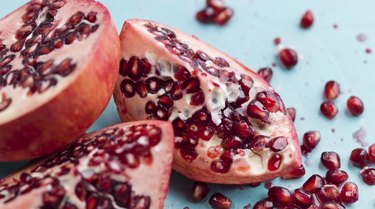
Constipation is a condition that affects people and children of all ages. According to the National Institute of Diabetes and Digestive and Kidney Diseases, approximately 16 out of every 100 adults have this condition. Pomegranates can help with constipation relief.
While a number of factors may cause constipation, a change in your eating habits is one of the most effective treatments. Increasing your intake of high-fiber foods like pomegranates may help.
Video of the Day
Video of the Day
Just be sure to drink plenty of fluids as you increase your fiber consumption to help avoid stomach cramping or excess gas — drink at least six to eight glasses of clear, caffeine-free liquid. Talk to your doctor if you have problems with recurrent constipation.
Read more: Can You Eat a Pomegranate Seed?
Boost Fiber Intake
If you're constipated, it's likely you're not consuming enough fiber. According to the National Academies of Sciences, men need 38 grams of fiber per day and women need 25 grams per day.
According to the USDA, a 1/2-cup serving of pomegranate seeds, or arils, contains 2.98 grams of fiber, or 8 to 12 percent of your daily needs.
Constipation and Pomegranates
Dietary fiber occurs naturally in two forms: soluble and insoluble. Soluble fiber absorbs water in your digestive tract and slows the passage of stool, but insoluble fiber increases intestinal activity. A high intake of foods rich in insoluble fiber is linked to a decreased risk of constipation.
According to a study published by International Journal of Current Microbiology and Applied Sciences in 2014, about 80 percent of the average pomegranate's total dietary fiber consists of insoluble fiber, or approximately 2.8 grams in every 1/2-cup serving of arils — more than you'd obtain from most fruits and vegetables.
Consider Pomegranate Juice
Eating raw pomegranate seeds isn't the only way pomegranates can help ease or prevent constipation. The American Cancer Society says drinking plenty of clear fluids, including fruit juices like pomegranate juice, can also help maintain healthy bowel function.
Choose unsweetened, 100 percent pomegranate juice, and limit your intake to 8 to 12 ounces per day for adults. Juice has more calories and sugar per serving than fresh fruit and offers none of the fiber. According to the USDA, 1 cup of pomegranate juice contains:
- 150 calories
- 0 grams of protein
- 0 grams of fat
- 37 grams of carbohydrates
- 0 grams of fiber
- 34 grams of sugar
Consult Your Doctor
For some people, eating more high-fiber foods like pomegranates doesn't relieve constipation. A small study of 63 individuals with constipation, published in September 2012 by World Journal of Gastroenterology, found that some subjects with unexplained, chronic constipation who were asked to temporarily reduce or eliminate dietary fiber from their diets experienced a decrease, not an increase, in their symptoms.
The scientists concluded that more research is needed to determine why a fiber-rich diet prevents constipation in some instances but seems to exacerbate it in others. If you're eating plenty of insoluble fiber from sources like pomegranates but are still frequently constipated, consult your doctor.
- International Journal of Current Microbiology and Applied Sciences: "Fiber Content and Quality of Pomegranate (Punica granatum L.) Cultivated in a Coastal Oasis"
- American Cancer Society: "Constipation"
- World Journal of Gastroenterology: "Stopping or Reducing Dietary Fiber Intake Reduces Constipation and Its Associated Symptoms"
- National Institute of Diabetes and Digestive and Kidney Diseases: "Definition & Facts for Constipation"
- National Academies of Sciences: "Macronutrients"
- USDA FoodData Central: "Pomegranate Arils"
- USDA FoodData Central: "Pomegranate Juice"
Is this an emergency? If you are experiencing serious medical symptoms, please see the National Library of Medicine’s list of signs you need emergency medical attention or call 911.